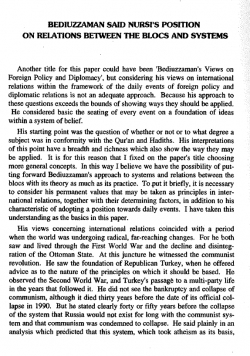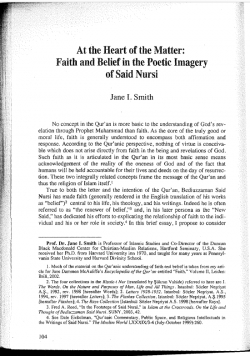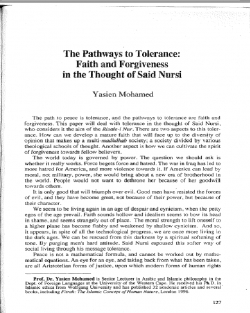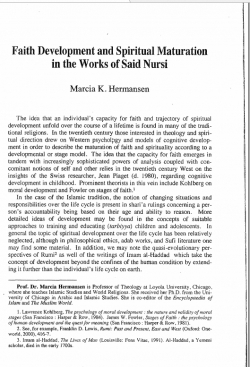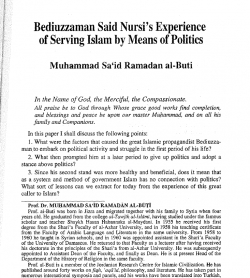Ph.D. Thesis - Doktora Tezi Wilfred Cantwell Smith and Said Nursi on Faith: Convergences and Divergences
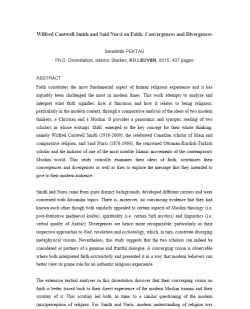
Book Stores
Type
E-Book
Authors
PEKTAS ( Serafettin )
Category
Ph.D. Thesis - Doktora Tezi
[ Browse Items ]
Publication Year
2015
Publisher
KU LEUVEN, Belgium
Series Name
Abstract
Faith constitutes the most fundamental aspect of human religious experience and it has arguably been challenged the most in modern times. This work attempts to analyze and interpret what faith signifies, how it functions and how it relates to being religious, particularly in the modern context, through a comparative analysis of the ideas of two modern thinkers, a Christian and a Muslim. It provides a panoramic and synoptic reading of two scholars in whose writings ‘faith’ emerged as the key concept for their whole thinking, namely Wilfred Cantwell Smith (1916-2000), the celebrated Canadian scholar of Islam and comparative religion, and Said Nursi (1876-1960), the renowned Ottoman-Kurdish-Turkish scholar and the initiator of one of the most notable Islamic movements of the contemporary Muslim world. This study critically examines their ideas of faith, scrutinizes their convergences and divergences as well as tries to explore the message that they intended to give to their modern audience. Smith and Nursi came from quite distinct backgrounds, developed different carriers and were concerned with dissimilar topics. There is, moreover, no convincing evidence that they had known each other though both similarly appealed to certain aspects of Muslim theology (i.e. post-formative mediaeval kalām), spirituality (i.e. certain Sufi mystics) and linguistics (i.e. verbal quality of Arabic). Divergences are hence more recognizable, particularly in their respective approaches to God, revelation and eschatology, which, in turn, constitute diverging metaphysical visions. Nevertheless, this study suggests that the two scholars can indeed be considered as partners of a genuine and fruitful dialogue. A converging vision is observable where both interpreted faith existentially and presented it in a way that modern believers can better view its prime role for an authentic religious experience. The extensive textual analyses in this dissertation discover that their converging vision on faith is better traced back to their direct experience of the modern Muslim trauma and their scrutiny of it. This scrutiny led both, in time, to a similar questioning of the modern (mis)perception of religion. For Smith and Nursi, modern understanding of religion was particularly flawed by the loss of the sense of the divine/transcendence and the concomitant dismissal of the significance of human-divine interaction. To challenge it, they similarly pursued a critical engagement with the modern condition, unlike many other fellows. They tried to retrieve and restore the transcendental element in human life in a manner that could be relevant and communicable in the modern context. Their common proposal was (re-) introduction of ‘faith’ as a persistent, operative, living and indispensable divine-human relationship. While the emphasis is more on the human side of this relationship in Smith, it is on the divine side in Nursi. Yet they particularly converge in their deliberate attempt to construe faith as a dynamic nexus between theos and anthropos whereby the two is put in connection and not in mutual exclusivity. This attempt, the dissertation proposes, is best portrayed with a conic model in Nursi and an elliptical or parabolic model in Smith. Their non-centric schemes characterize a new sort of theological anthropology that challenges both the pre-modern theocentric and modern anthropocentric mindset. As such, both can be positioned within the wider theological current that emerged in Europe in early twentieth century. This study identifies three points where their respective understandings of faith converge, even sometimes overlap: i) Faith is indispensable for human authenticity and crucial to achieve human fulfillment; ii) Faith is a total self-commitment and involves the whole personhood. It, hence, cannot be reduced merely into an intellectual expression or credo. iii) Faith is fundamentally a personal experience and corresponds to a deep, ongoing and vivid engagement with the divine reality. It is, hence, less to do with ideology, formal entity, system or doctrine. This study finally questions the practical implications of the two thinkers’ concept of faith. It argues that their converging existential interpretation bears inherent and strong challenges against Islamism which emerged as a modern anomaly where a transcendental idea(l) turned into a mundane ideology. It also discusses the implications of their idea of faith in addressing the contemporary religious plurality.
Number of Copies
1
| Library | Accession No | Call No | Copy No | Edition | Location | Availability |
|---|---|---|---|---|---|---|
| Main | 193 | 1 | Yes |
